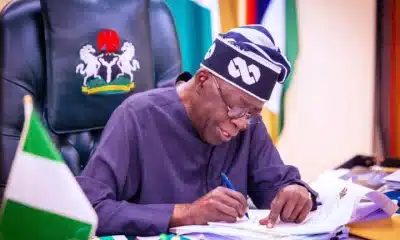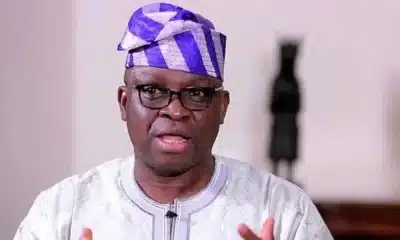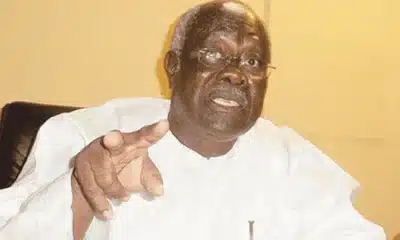Nigeria News
Does It Make Any Sense? Tinubu’s Minister Repeating Mistake Of Buhari Gov’t – Obiaraeri Fumes

A development economist, Nnaemeka Obiaraeri, has criticized a proposal by the Minister of Agriculture, Abubakar Kyari, to import 10,000 tractors to Nigeria.
During an interview with Channels TV on Tuesday, Obiaraeri recalled that concerns were previously raised in 2019 regarding a similar plan during the administration of former President Muhammadu Buhari.
Obiaraeri expressed worries that the current plan under President Bola Ahmed Tinubu‘s administration, which is projected to cost $1.1 billion through a public-sector arrangement, would essentially be repeating the same mistake made by the Buhari government.
The economist argued that a more effective approach would involve spending $750 million to import both tractors and bulldozers.
He said, “There was a proposal we raised in 2019 when the Buhari government came up with the idea of borrowing 1.1 billion dollars to import 10,000 tractors.
“This current government now, we see the minister of agric repeating the same mistake the Buhari government did, signing MoU to import 10,000 tractors under a public sector arrangement that will cost the same $1.1 billion.
“Does it make sense to you that we can spend $750 million and import both tractors and bulldozers, and somebody is trying to spend $1.1 billion to import only tractors? Does it make sense to you? And that is the kind of thing we see in Nigeria.
“Under the structure that we shared with them, you would have agro clusters in all over the 8,000 electoral wards that would be managed by thoroughly trained mechanical engineers.
“Farmers within those clusters would hire those machines and use them on their farms on an average cost of not more than N40,000.
“And when you do it, you would stimulate economic activities, you would grow jobs, you would have over $50 billion in Nigerian economy, but the minister in Nigeria today wants to repeat the same mistake that happened under the Buhari regime is something we should be asking ourselves.”
Nigeria Only Has 5,000 Tractors For Mechanised Farming – FG
Naija News recalls that the Federal Government had disclosed a month ago that the country only has 5,000 units of tractors working perfectly for mechanised farming.
The Minister of Agriculture and Food Security, Abubakar Kyari, stated this during the sectorial debate on food security at the House of Representatives.
According to Kyari, the country needs at least 72,000 units of tractors to successfully embark on mechanised farming, adding that Nigeria has not made significant progress in mechanised agriculture.
The minister asserted that the lack of tractors for large-scale farming is a huge setback for us in the country.
He said: “Today, we find out that people are just doing agriculture as a means of survival and subsistence. We have to make agriculture (as a) business. We have to turn it around.
“Today, I am not too sure if we have 5,000 tractors fully working in Nigeria. With what we have in terms of arable landscape, we need over 72,000.”
The minister said the federal government signed a Memorandum of Understanding (MoU) with John Deere, an agricultural equipment manufacturer in the US, to supply the country with tractors.
He said the MoU, which was signed in November 2023, involves John Deere supplying the country with 2,000 tractors a year for the next five years.
Kyari said, “As I speak, they are in Lagos today and will arrive in Abuja this evening. We will hold a meeting for the second time with the partners who are here.”
The minister said President Bola Tinubu has directed that 42,000 metric tons of assorted grains be distributed to address the food inflation in the country.
Kyari said the remaining 11,000 is for “strategic storage” for uncertainty that may befall the country.
He said the 42,000 are being distributed by the National Emergency Management Agency (NEMA) in collaboration with the Office of the National Security Advisor (ONSA).
The minister said the federal government received 5,000 metric tons of grains from the Economic Community of West African States (ECOWAS), which will be added to the 42,000.
He noted that COVID-19, flooding, the naira redesign policy, and smuggling impacted food production in the country and raised food prices.












